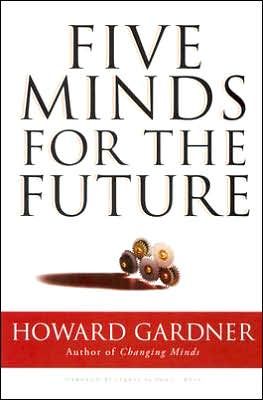Howard Gardner, a brilliant thinker about thought, describes the mental capacities everyone must develop to succeed today and in the future.

Cognitive Capacities
Howard Gardner – Harvard psychologist, MacArthur genius grant recipient and prolific author – started a revolution when he argued that human capability can’t be reduced to a single metric. Rather than accepting IQ as the arbiter of cognitive capacity, Gardner held that people have “multiple intelligences,” a notion he popularized in his 1983 groundbreaking book, Frames of Mind: The Theory of Multiple Intelligences.
In this clear, eminently useful follow-up, Gardner describes five cognitive capacities he predicts will be most in demand in the future – abilities he advises everyone to develop and practice. These forms of thought, he notes, are neither innate nor immutable.
Given accelerating technological change, increases in information flow and the necessity of collaborating with different people worldwide, Gardner’s insights will be valuable to anyone trying to think ahead.
Build Five Skills and Five Minds
Gardner asserts that those who wish to avoid menial labor must accomplish five things. First, people need to develop a core competency, a discipline you’ve mastered and continue to build. Second, it is important to learn to synthesize information from diverse sources quickly and accurately.
People are loath to alter practices with which they were raised and…are now all too comfortable.Howard Gardner
Third, because computers increasingly handle society’s mundane, noncreative work, focus on creative problem-solving. Fourth, a diverse workplace, like a diverse world, demands respectful, tolerant employees. Finally, people must act responsibly and ethically.
Gardner asserts that the five minds you need to handle what’s coming in the future are:
“The Disciplined Mind”
Learning a bunch of facts won’t create a disciplined mind – a mind that can think in the distinctive ways that an academic or professional discipline requires. When properly trained, for example, lawyers think like lawyers, engineers like engineers, and historians like historians. Everyone should be broadly familiar with science, math, history and the arts.
People who know a subject deeply think about it in terms of storytelling, debate, graphics, humor, drama or classic exposition. The disciplined mind intrinsically enjoys learning and never stops soaking up information because more knowledge emerges daily.
“The Synthesizing Mind”
Plato, Aristotle, Augustine, Aquinas and others in the Middle Ages sought to organize all human knowledge. However, contemporary human knowledge doubles every few years and without synthesis, much of it is unusable. Gardner posits narrative as the oldest form of synthesis. Taxonomies are another. Aphorisms, too, express lots of knowledge in compact statements.
In overcoming hatred, rivalry, the burdens of history, it is crucial to search for common ground.Howard Gardner
In order to synthesize, articulate your goal – what your synthesis hopes to achieve. Choose a base on which to build something real – a draft of an essay, a sketch or an architectural model. Revise it. Remember that synthesis projects can become so general and inclusive that they are meaningless, so be as specific as you can.
“The Creating Mind”
Businesses need creative people. In times past, people feared creativity or misunderstood it as the product of divine intervention or pure luck. Then people came to regard creativity as a special property that certain humans possessed and others lacked.
Gardner describes three elements that interact to foster lasting creative breakthroughs. Creativity requires an individual who has mastered a discipline and constantly works in that area. Creativity needs a “cultural domain” that provides models, rules and norms to work with or against – such as the rules governing sonnets, for example. Third, the individual needs an institutional “social field” that provides opportunities to demonstrate creativity.
The missing ingredient is a creative temperament, which need not be innate. Creative people are dissatisfied with their work and the work of others. They can go against the grain, notice anomalies and try to explain them. Creative people are tough and tenacious; hard work or failure does not deter them. When they succeed, they look over the horizon to the next mountain to climb.
“The Respectful Mind”
Human beings naturally band together in groups, and, Gardner laments, no sooner have such groups formed than they come to dislike one another. Members of groups define themselves relative to other “outgroups,” which they characterize as inferior, dangerous or subhuman. People must overcome this tendency. Modern weapons and an interconnected world make it far too dangerous.
Rather than ignoring differences, being inflamed by them, or seeking to annihilate them through love or hate, I call on human beings to accept the differences, learn to live with them, and value those who belong to other cohorts.Howard Gardner
Gardner’s solution to this problem is simple: Cultivate respect for others. Teaching respectfulness in school fosters tolerance. Students can learn to overcome their differences politely and to see that “different” does not mean “defective.” Students should learn the history of intolerance and its destructive effects on mankind. With this foundation, students later cultivate tolerance and respect in the workplace or political realm.
“The Ethical Mind”
Given a choice, most people would opt for life in an “ethical world” in which everyone focused on doing “good work.” Gardner argues that to do good work, you need a mission that embodies your values; a moral model to emulate; a mirror test in which you evaluate yourself; and a mirror test for your colleagues to ensure they behave ethically.
The attainment of an ethical mind is easier when one has been raised in a milieu where good work is the norm.Howard Gardner
Without these tools, you may suffer an ethical lapse. The ethical mind must always be vigilant.
A Wealth of Minds
At first, you may not grasp the precise point of Gardner’s essayistic approach to characterizing the mind that the future requires. He’s an efficient writer and doesn’t waste time musing, but his theme emerges from precisely the engaged free-floating thought he believes is crucial for creativity and for embracing an increasingly information-driven world. That is, while describing an evolved, sophisticated mind, Gardner warns again and again of the seductive trap of facts and urges readers to look beyond them. This not-quite-practical manual seems aimed at those who study thinking as well as those who are curious about how to develop their mind.
Howard Gardner’s books include Multiple Intelligences: New Horizons in Theory and Practice, Frames of Mind: The Theory of Multiple Intelligences, Changing Minds: The Art and Science of Changing Our Own and Other People’s Minds, Leading Minds: An Anatomy of Leadership and A Synthesizing Mind: A Memoir from the Creator of Multiple Intelligences Theory.













